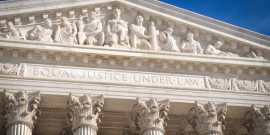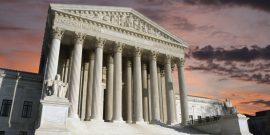Dimaya v. Sessions is a milestone simply because the Court struck down a provision of immigration law, but it has wider implications.
Chevron Cannot Be Justified as an Agency Determination of Policy
In my last post on Administrative Law, I noted that many defenders of Chevron deference ignore an essential aspect of such deference: that granting deference to agencies is likely to result in more biased decisionmaking because it allows agencies to depart from the separation of powers.
Here I want to examine a different problem with the arguments for Chevron deference. It is sometimes argued that the cases that receive Chevron deference involve policy questions. And therefore it is thought appropriate that agencies should make these decisions, because courts are worse at making policy decisions than agencies. But this argument rests on a mistaken premise: Chevron deference does not defer to an agency policy decision.
One used to hear this argument for Chevron deference in the early years under Chevron and I thought it had been abandoned. But I continue to hear the argument, so it is worthwhile exploring it.
Chevron deference provides that when Congress has not clearly spoken in a statute to the issue at hand, the agency should be allowed to select any reasonable interpretation of the statute. At Chevron Step 1, the court considers whether Congress has spoken clearly to the issue. If the answer is no, then the court moves on to Chevron Step 2, where the court will reject the agency’s interpretation only if it is unreasonable. Some defenders of Chevron argue that Chevron Step 2 involves a policy issue and therefore it is appropriate that the agency make the decision.
But this argument is clearly mistaken. At both Step 1 and Step 2, the court is reviewing an interpretation of the statute. Thus, by definition and in actuality, the decision at issue is a legal one. The difference between Step 1 and Step 2 is not that the former involves a legal issue and the latter involves a policy issue. Instead, it is that Step 1 involves a clear legal issue and Step 2 involves a close legal issue. But a close legal issue is still a legal issue. It is just one where the answer is not clear.
Why then do some people view Step 2 questions as policy questions? One reason is that they believe that judges consider their own policy views when answering these questions. But that is not a good argument. That some judges undoubtedly improperly consider their own policy views when answering legal issues does not transform them into policy questions. It merely shows that the judges are misbehaving.
Another reason why people believe Step 2 questions are policy issues is that one way of resolving close legal questions involves considering the purpose of the statute. Many people confuse the purpose of the statute with a policy question. But again that is mistaken. The purpose of the statute involves the policy that the Congress enacted or intended. That differs from what the policy that the judges believe the statute should promote.
Once one recognizes that Step 2 questions under Chevron are legal issues, not policy questions, another of the arguments for Chevron falls away.



